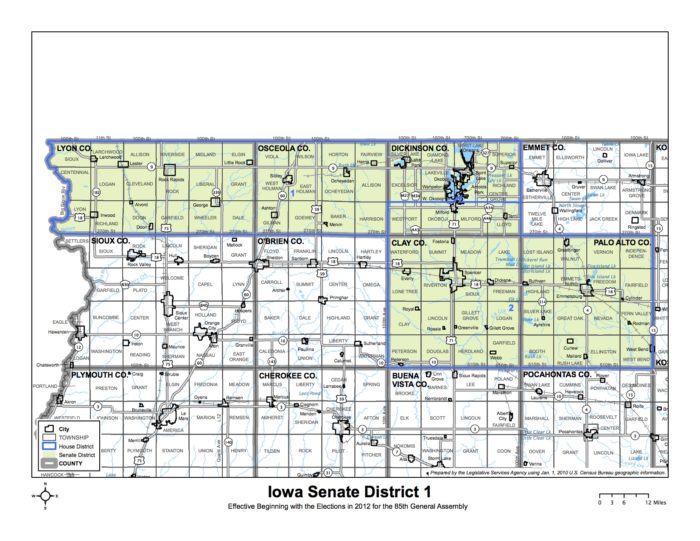State Senator David Johnson, the only independent to serve in the Iowa legislature in recent decades, announced today he will not seek re-election in November. He had won four previous state Senate races as a Republican and indicated last year that he planned to run for another term. However, Johnson had neither raised nor spent any money from his campaign account since January 1.
The retirement gives the GOP, which already holds 29 of the 50 seats in the upper chamber, a clear shot at picking up Senate district 1 in the state’s northwest corner. According to the latest figures from the Iowa Secretary of State’s office, this district contains 7,304 active registered Democrats, 20,589 Republicans, and 13,333 no-party voters. Only one seat (nearby Senate district 2) is more heavily skewed toward the GOP. Brad Price, Zach Whiting, and Jesse Wolfe are competing for the GOP nomination in Johnson’s district. Democrats did not field a candidate here.
Johnson left his party in June 2016 to protest the impending nomination of Donald Trump for president. In today’s statement, he thanked “all those who have supported my efforts to shine a spotlight on how polarized and partisan the political process has become,” adding that “As a private citizen, I will find a place to be an advocate for education, the environment, access to health care and fiscal responsibility.” After serving in the minority caucus for ten years, Johnson could have kept quiet about Trump and chaired an Iowa Senate committee following the 2016 GOP landslide. Instead, he took a principled stand and paid a price.
The longtime Republican joined Senate Democrats in opposing many of the high-profile bills the majority passed during the 2017 and 2018 legislative sessions, with the exception of new restrictions on abortion, which he supported. GOP leaders denied their former colleague committee assignments, which limited Johnson’s ability to work on legislation before it reached the Senate floor. Nor did they allow the many bills Johnson introduced or co-sponsored to move forward. Strengthening regulations on confined animal feeding operations (CAFOs), improving water quality programs, and returning the Medicaid program to state management were among his top priorities.
Arguably Johnson’s most influential act of these past two years was asking Attorney General Tom Miller for a formal opinion on key questions related to the transfer of power following Governor Terry Branstad’s resignation. Miller had previously indicated that he thought Kim Reynolds would be able to name a new lieutenant governor. After exhaustive research prompted by Johnson’s request, the attorney general determined last year that Reynolds lacked the constitutional authority to appoint a new lieutenant governor. For that reason, Adam Gregg does not officially hold the title of lieutenant governor and is not in the line of succession. (Iowa Senate President Charles Schneider would assume the governor’s powers if Reynolds became unable to serve at any time before next January.)
During the 2018 legislative session, House and Senate Republicans took the first step toward amending the Iowa Constitution to clarify the gubernatorial succession process. Without Johnson, that never would have happened.

